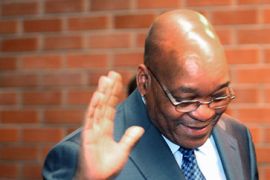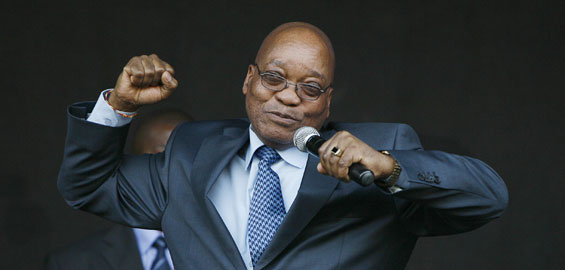Profile: Jacob Zuma
Dismissal of corruption charges paves way for ANC leader to become SA president in 2009.

 |
| Zuma remains wildly popular despite repeated corruption allegations [AFP] |
Zuma, born in the KwaZulu-Natal province, joined the ANC in 1959 and became an active member of its armed wing in 1962. He was arrested in 1963, convicted of conspiring to overthrow the government and sentenced to 10 years in prison on Robben Island.
Thabo Mbeki, the current president, chose Zuma – an ethnic Zulu – as deputy president in 1999, in part in recognition of the role he had played in ending violence between ANC members and members of the main Zulu party in the KwaZulu-Natal province.
However, in June 2005 Mbeki fired Zuma after his financial adviser was convicted of fraud and bribery in a multi-billion dollar arms deal. Zuma remained deputy president of the ANC, under Mbeki.
Charges against Zuma, alleging he was aware of his adviser’s efforts to elicit a $70,000 bribe for him to deflect investigations into the deal, were later thrown out on a technicality.
Aids gaffe
In 2006, Zuma was acquitted of raping a family friend after describing the sex as consensual.
But he outraged Aids activists and prompted public questions about his leadership ability and judgment when he testified during the trial that he had unprotected sex with the HIV-positive woman and believed taking a shower afterward would protect him.
He was head of the National Aids Council at the time.
After the rape and corruption charges, few thought Zuma had a political career left but he remained popular and in December 2007 he defeated Mbeki in a bitter contest for the ANC leadership.
However, the victory celebrations were short-lived as shortly afterwards the National Prosecuting Authority said it had new evidence against Zuma and filed racketeering, corruption, money laundering and fraud charges.
Charges dismissed
Prosecutors accused Zuma of accepting hundreds of thousands of dollars in bribes from the French company Thint, formerly Thomson CSF, to use his influence to stop investigations into government arms contracts.
However, a South African court threw out corruption charges against Zuma on September 12, 2008, clearing the way for him to run as the country’s next president in 2009.
Nicholson said there had been political interference in Zuma’s case and ordered the state to his legal costs.
He said: “I am therefore not convinced that the applicant [Zuma] was incorrect when he averred political meddling in his prosecution.”
Nicholson cautioned that his ruling did not touch on guilt or innocence and said prosecutors could file charges again once they had met the requirement of consulting with Zuma.
But the National Prosecuting Authority is likely to come under pressure not to file charges again.
Political plot
In the run up to the court’s decision, the country’s largest trade union federation, the South African Communist Party and the left-wing ANC Youth League had rallied behind Zuma, maintaining that he was the victim of a plot to stop him from becoming president.
Thousands of ANC supporters and union members had repeatedly turned out to offer their support to Zuma.
Julius Malema, the head of the Youth League, said in June that he was “prepared to take up arms and kill for Zuma”.
The ever-smiling Zuma has an easy style with people characterised by his tendency to break into dance often accompanied by supporters singing his signature tune “Umshini Wami” (Zulu for “Bring Me My Machine-Gun”).
“In Zuma we see ourselves, we see humility, down to earth. We see somebody we can speak to, who has a genuine love for people,” Zwelinzima Vavi, general secretary of the Congress of South African Trade Unions, said.
Following September’s court decision, Zuma looks certain to succeed Mbeki as president, given the ANC’s dominance in South African politics.